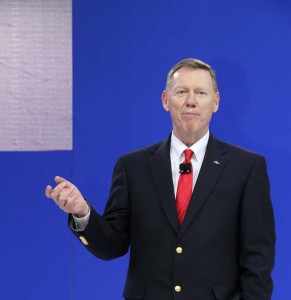
Ford CEO Alan Mulally labels has led an aggressive campaign criticizing Japan for currency manipulation.
Detroit automakers have stepped up their attacks on Japan’s inclusion in the Trans Pacific Partnership, intensifying claims that Japan has continued to manipulate its currency – which would create a lopsided playing field working to the advantage of Japanese competitors.
American Automotive Policy Council President Matt Blunt noted in a hearing scheduled by the U.S. Trade Representative this week that imports account for only 6% of the vehicles sold in Japan each year, which is the lowest figure in the developed world. The U.S. is next with 45%, while in Germany, 56% of the vehicles sold are actually imports.
“Today’s hearing was an important step towards making sure all involved in the TPP talks understand the need for Japan to commit itself to strong and enforceable disciplines on the use of currency manipulation and a level playing field for auto manufacturers, which have been the engine of the U.S. manufacturing recovery,” Blunt said.
The Japanese yen has gone from a 1-year low 77.85 last September to a recent high of 102.30 – though it has settled back in recent days to just under 100 to the U.S. dollar.
“The current eleven member nations of the Trans-Pacific Partnership are dedicated to an advanced, 21st century agreement. With Japan joining, it cannot be allowed to continue to rely on currency manipulation policies and non-tariff barriers to keep foreign competitors from its domestic market which cost U.S. jobs and undermine U.S. exports,” Blunt.
In his testimony, Blunt called on the Obama Administration to ensure the TPP includes strong and enforceable currency provisions, elimination of Japan’s non-tariff barriers, and a robust and accelerated auto dispute settlement mechanism, as well as other commitments.
“A standard free trade agreement with Japan will reward them with nearly $1 billion in annual tariff savings and allow for a massive loophole to remain in place by not preventing currency manipulation,” Blunt said in his testimony. “According to the Center for Automotive Research this could lead to the loss of nearly 100,000 American jobs. Unless the final text of the TPP Agreement includes the provisions proposed in our submission, it will be impossible for the AAPC to support the TPP Agreement,” he said.
President Obama has called approval of the TPP, which would reduce trade barriers among 11 nations circling the Pacific Rim, a top priority. The TPP also would serve as a counterweight to the rising Chinese economic power throughout the Pacific.
However, U.S. carmakers are having none of it as executives from major companies such as Ford Motor Co. and Chrysler Group LLC have blasted Japanese currency manipulation. “I don’t think there is any such thing has free trade,” said Reid Bigland, Chrysler’s head of U.S. sales, who noted that Japanese carmakers have already embarked on a round of price cuts in the U.S. to boost sales.
Joseph Hinrichs, Ford executive vice president and President of the Americas, followed up on CEO Alan Mulally’s recent attack on Japan’s efforts to manipulate the value of yen. Japan’s currency manipulation has to be addressed if the Japanese are going to take part in the Pacific trade pact, Hinrichs told reporters in Dearborn.
“We’ve always said we support free trade,” Hinrichs told reporters during the introduction of new pickup truck at the company’s headequarters in Dearborn, Michigan. “But we also believe currency shouldn’t be influenced by government intervention,” he said.
The recent shift in exchange rates could provide a substantial boost to Japanese exporters, especially considering the challenges they faced when the yen fell to historic lows over the last several years.
Earlier this year, the Bloomberg news service reported that Toyota officials had estimated each one-yen decline against the dollar is worth about 35 billion yen – or $377 million – in operating profits.
But Japanese auto industry officials downplay the potential competitive advantage. Nissan CEO Carlos Ghosn has insisted that, if anything, the playing field is just now being leveled at around 100 yen to the dollar, after several years in which it was all but impossible for makers like Nissan to make money on exports. And, he has noted, the second-largest Japanese maker is continuing to shift production out from Japan, the Rogue crossover about to become the latest high-volume model that Nissan will build in the U.S.
“When the yen was as strong as it was,” echoes Mike Accavitti, senior marketing chief at American Honda, “it was a real problem for our profitability.” And even at current rates, he asserted, “It’s still not at a normal level.”
It’s unlikely domestic and Japanese automakers will see eye-to-eye on the exchange rate issue, but whether currency manipulation will become a factor worked into the proposed Trans Pacific Partnership is yet to be determined.
Paul A. Eisenstein contributed to this report.

Asia is buying up U.S. real estate so they might as well control our economy too…